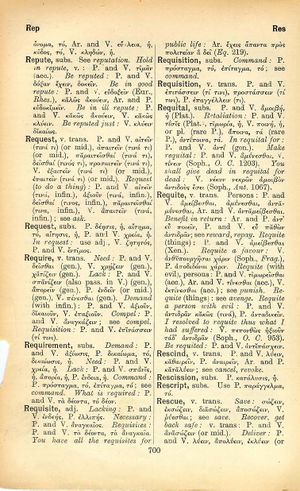requite: Difference between revisions
mNo edit summary |
m (WoodhouseExtra replacement) |
||
| Line 19: | Line 19: | ||
[[be requited]]: P. and V. [[ἀντιπάσχειν]]. | [[be requited]]: P. and V. [[ἀντιπάσχειν]]. | ||
}} | |||
{{WoodhouseExtra | |||
|woodxtr=[[ἀμείβεσθαι]], [[ἀμύνεσθαι]], [[ἀνταμύνεσθαι]], [[ἀνταμείβεσθαι]], [[τιμωρεῖσθαι]], [[τίνεσθαι]], [[ἐκτίνεσθαι]] | |||
}} | }} | ||
Revision as of 14:21, 20 May 2020
English > Greek (Woodhouse)
verb transitive
persons: P. and V. ἀμείβεσθαι, ἀμύνεσθαι, ἀνταμύνεσθαι, Ar. and V. ἀνταμείβεσθαι.
benefit in return: Ar. and P. ἀντ' εὖ ποιεῖν, P. and V. εὖ παθὼν ἀντιδρᾶν; see reward, repay.
requite (things): P. and V. ἀμείβεσθαι (Xen.).
requite a favour: V. ἀνθυπουργῆσαι χάριν (Soph., Frag.), P. ἀποδιδόναι χάριν.
requite (with evil), persons: P. also V. τιμωρεῖσθαι (acc.), Ar. and V. τίνεσθαι (acc.), V. ἐκτίνεσθαι (acc.); see punish.
requite a person with evil: P. and V. ἀντιδρᾶν κακῶς (τινά), P. ἀνταδικεῖν.
I resolved to requite thus what I had suffered: V. πεπονθὼς ἠξιοῦν τάδ' ἀντιδρᾶν (Soph., Oedipus Coloneus 953).
be requited: P. and V. ἀντιπάσχειν.
English > Greek (Woodhouse Extra)
ἀμείβεσθαι, ἀμύνεσθαι, ἀνταμύνεσθαι, ἀνταμείβεσθαι, τιμωρεῖσθαι, τίνεσθαι, ἐκτίνεσθαι

